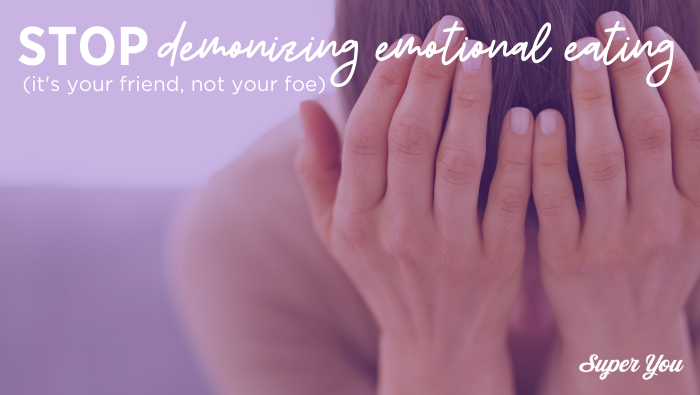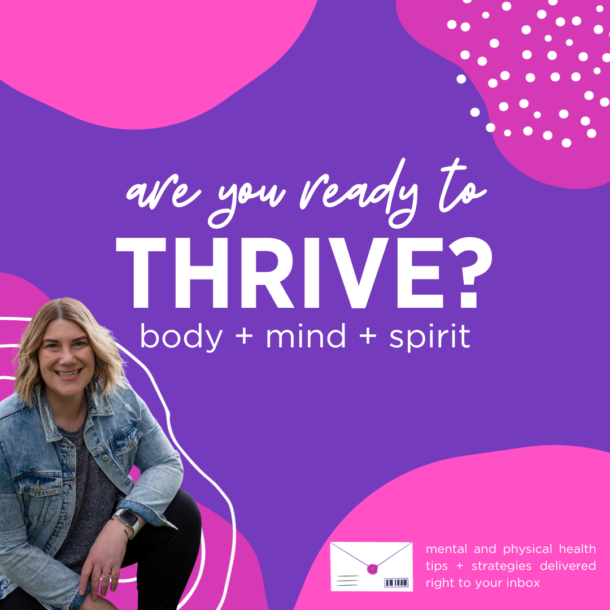In our Diet Culture-driven relationship with food one of the core messages (beyond you must diet to be “healthy”), is that food and your relationship with it is a moral one. There are good foods and bad foods. There are also good and bad habits around food. Enter, emotional eating.
What is Emotional Eating?
Simply put, Emotional Eating is eating when you’re not physiologically hungry or struggling with Primal Hunger. Triggers for Emotional Eating vary from boredom and procrastination to celebration and excitement to anxiety, depression, and frustration. And there’s a very clear message in Diet Culture that if you use food to soothe, cope or distract you are (insert morality) bad and wrong.
But you aren’t bad and wrong, you’re human.
And from the moment you were born you’ve used food to soothe, cope and distract.
Anyone who’s parented or provided child care gets this. Baby cries, feed them. Sure, they may not be hungry, but the breast or bottle is likely to work. Kiddo falls and scrapes his knee, let’s go have a cookie. First break-up? Why don’t we go get ice cream, that’ll make you feel better.
But will food actually make me feel better?
The short answer here is YES! When we eat there is a wonderful cascade of hormones that are triggered that…make us feel good (oh hello serotonin and dopamine). Layer upon that the fact that food itself is pleasurable and it’s no wonder we eat for any and all emotions.
Emotional eating is also part of the fabric of our culture. We celebrate and comiserate with food and it’s normalized to do so. But yet, it’s also demonized.
Here’s where things get tricky.
I really need you to hear this: using food to cope with your emotions is ok. Like, really ok. And, if…
- it’s your only tool, this might be something to look at.
- using food in this way makes you feel crappy, this may be something to look at.
- you consistently over-consume food because you can’t cope with your emotions, this is something to look at.
But it really is OK. Legit. The goal of Intuitive Eating is not to demonize this long-serving tool, but rather to explore whether that tool is serving you and add more tools to your emotional resilience tool-kit so it’s not the only tool you can reach for.
Exploring Emotional Eating (minus the judgement and shame of Diet Culture)
There’s a lot to unpack and explore here, but here’s one of the core ideas around emotional eating that I think is a really powerful reframe:
Emotional Eating is a clue.
If we’re willing to get curious, our inclination to eat when we’re not physiologically hungry may offer insight into where we might need more support, structure, or satisfaction! In other words, Emotional Eating can serve as a cue for us to explore what’s really going on – and then look for other ways to meet our needs.
What? Yes. Walk with me.
Before I can explain that we need to start by exploring Emotional Eating.
Most Emotional Eating falls (generally) into one of 5 categories:
- Sensory Gratification – ie. you’re seeking a positive sensory experience/ satisfaction/ pleasure
- Comfort – ie. you’re soothing yourself. This might be something warm on a cold day or seeking a familiar feeling of “comfort food” when you’re having a hard time.
- Distraction – ie. you don’t want to feel the feelings and you’re looking to distract yourself.
- Sedation or numbing – ie. you really don’t want to feel the feelings and you’re pushing them down with food.
- Punishment – ie. you’re punishing yourself with over-eating to the point of removing ALL pleasure from food and making it very uncomfortable.
*The last two categories are worth exploring with a counsellor or ED specialist as this can be interrelated with a disordered relationship with food if it’s used a lot.
What if instead of saying “these are bad” you thought this instead:
“My behaviour is giving me CLUES!”
And then with your anthropologist (aka. non-judgemental curious observer) hat on you explored WHY you’re seeking to fulfill your needs with food?
Remember that there are no hard lines here. You might find your emotional eating is a smattering of a few or you might mostly land in one of these more often than not. It’s all good. There’s no right or wrong way to emotionally eat. It’s a strategy you’ve developed through your lived experience and for many, it’s a tool that serves them well (in the grand scheme of things!).
But consider how this insight into the nature of your emotional eating might offer you insight into your over-arching un-met needs.
Let’s explore!
If you find you’re seeking sensory gratification
Get curious:
- Was there enough pleasure or satisfaction in your other meals/ eating opportunities?
- What about generally in life? Is life all work/work/work with no play?
- Could you focus on satisfaction/ joy in your meals and life and see if that helps?
If you find you’re seeking comfort or soothing:
Get curious:
- What other self-nurturance/ comfort could you make use of?
- Are you getting enough sleep, adequate nourishment (aka self-care basics)?
- How are your boundaries and stress management?
If you find you’re seeking distraction:
Get curious:
- What are you trying to be distracted from?
- Are you able to identify what you’re feeling?
- Can you give yourself permission to explore these feelings?
- What other helpful distractions might better serve/ support you?
Remember…it’s not BAD that you’re using food.
It’s ok. It’s a tool in your tool-kit (and generally speaking a pretty benign one!). Sometimes you’ll have all the awareness in the world and still choose to use it. Because it’s convenient and effective.
And sometimes using food to cope might be the safest and healthiest choice for you. Because your mental and emotional health is a huge aspect of your overall health and well-being.
The goal here is not to demonize or eliminate emotional eating, but rather to view it as your friend and ally. To engage the curious, non-judgemental lens and explore. If you’re leaning on the tool more than you’d like – invite yourself to view it as a clue that offers you insight into what you need. Be curious and explore other ways to support yourself (in addition to releasing your judgments around using food).
If you’d like to explore emotional eating and the framework of Intuitive Eating connect with me about one-to-one coaching. You can learn more here. If you’re interested in learning solo you might enjoy my virtual Intuitive Eating Course.

